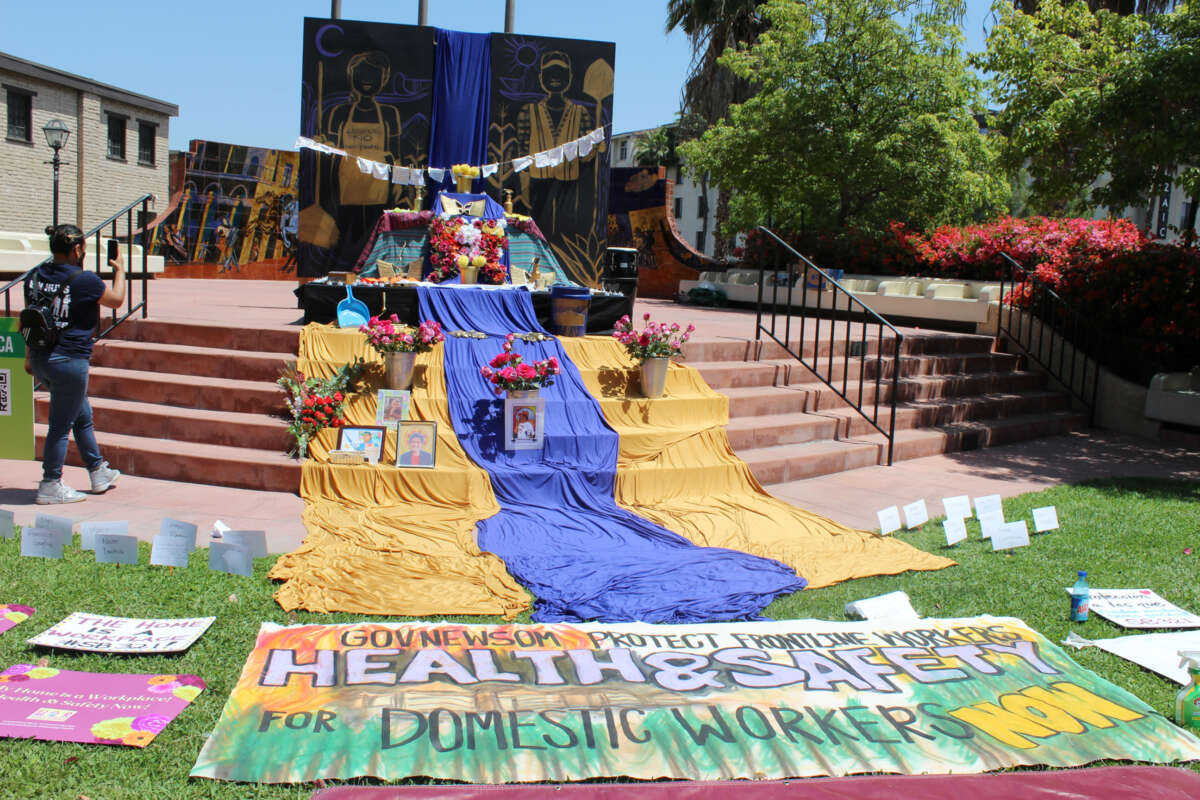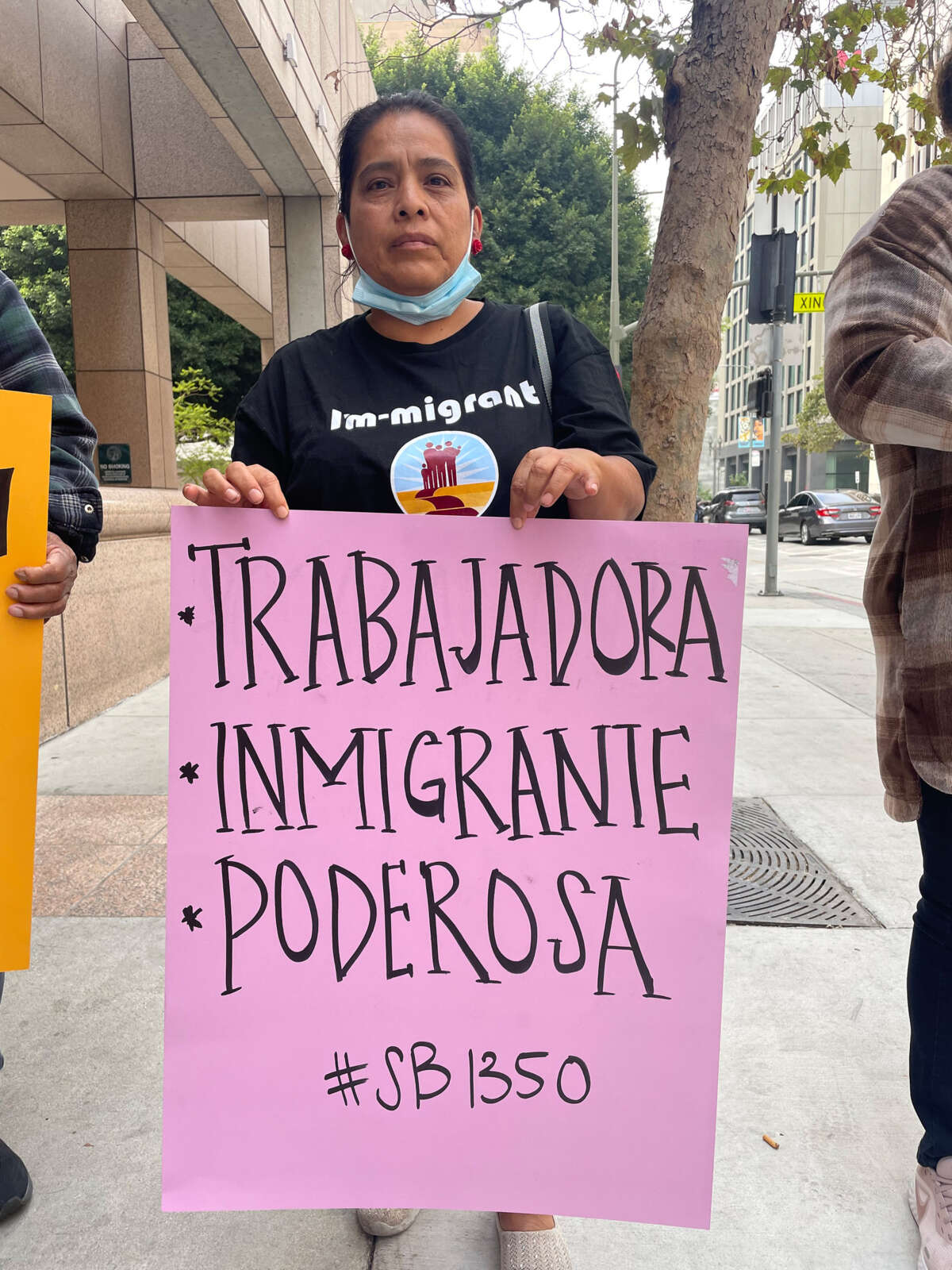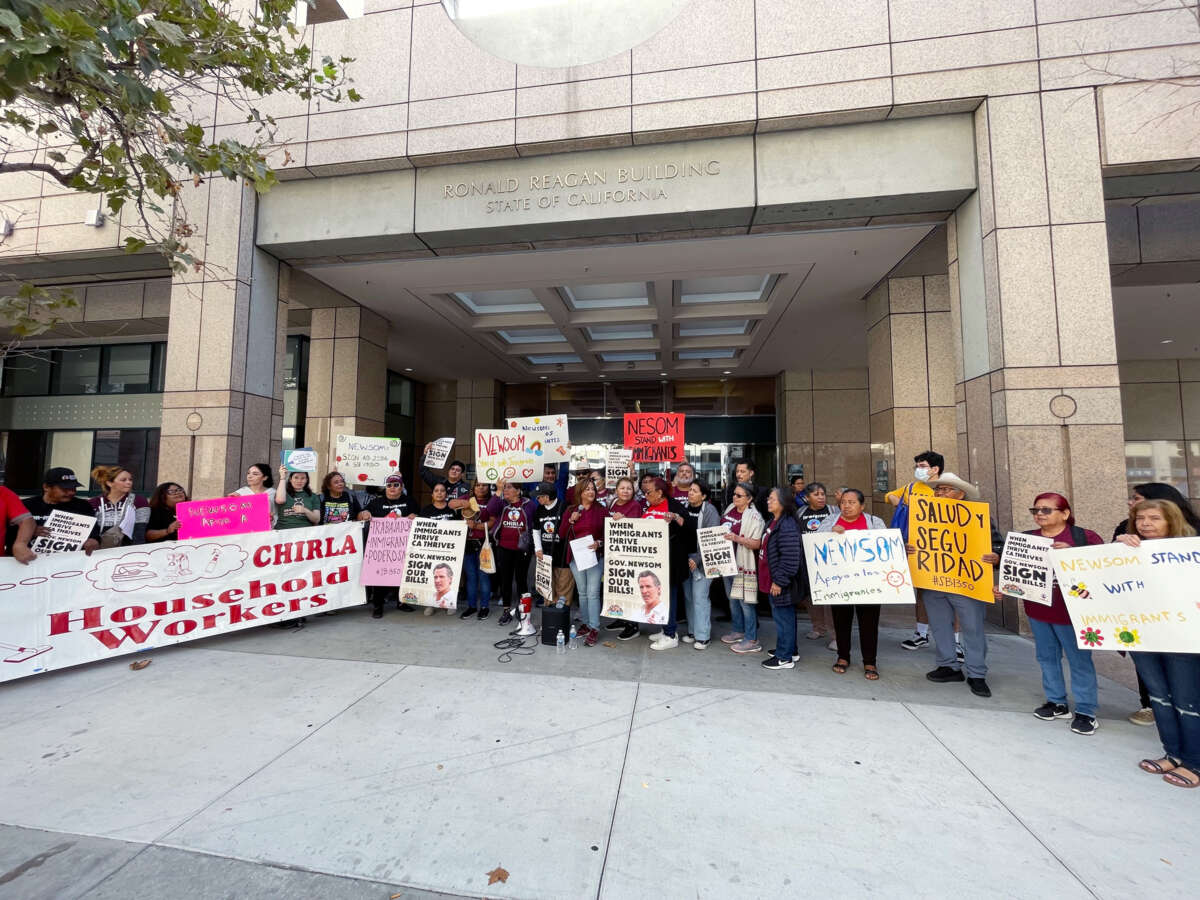Support justice-driven, accurate and transparent news — make a quick donation to Truthout today!
On September 28, domestic workers in California secured a long-fought victory with the signing of SB 1350, a bill that grants the California Division of Occupational Safety and Health (Cal/OSHA) the authority to enforce health and safety regulations in private homes that employ domestic workers.
Sponsored by California State Sen Maria Elena Durazo and supported by the California Domestic Workers Coalition, this legislation ends the discriminatory exclusion of domestic work from Cal/OSHA protections — an exclusion rooted in a racist and sexist history of labor in the U.S., where domestic work, primarily done by women of color, has been devalued.
The California Domestic Workers Coalition — whose steering committee is made up of Alianza de Mujeres Activas y Solidarias (ALMAS), Filipino Advocates for Justice (FAJ), La Colectiva de Mujeres San Francisco, Mujeres Unidas y Activas, Hand in Hand, Women Employment Rights Clinic, the Institute for Popular Education of Southern California (IDEPSCA), Pilipino Workers’ Center (PWC), the Coalition for Humane Immigrant Rights (CHIRLA), California Immigrant Policy Center and UCLA Labor Center — took to their social media platforms on to announce the news, explaining that the bill would cover more than 175,000 domestic workers who work for agencies doing child care and cleaning. The coalition posted:
After five years of fighting for Health and Safety for All Workers, we celebrate this win as a step forward in gaining health and safety rights for ALL domestic workers. We continue our commitment to ending the legacy of racism and exclusion that lives on in California’s labor laws today!
While this victory is undoubtedly a cause for celebration, some members of the coalition believe there is more to be won. Originally, the bill was to include domestic workers employed under an agency or “dueña de ruta” and workers facing “high hazard” conditions such as work done above seven feet, in the case of wildfire and disaster clean up or exposure to carcinogens. This second group of workers were carved out of the final bill during negotiations.
The win is bittersweet for many in the movement, as it also comes too late for some who have already suffered and lost their lives due to unsafe working conditions. While an exact tally for injuries and deaths is not available, a 2020 report by University of California Labor Occupational Safety and Health Program (UCLA LOSH) found that 51 percent of domestic workers surveyed reported experiencing “pressure from their employer to work in dangerous conditions.” An overwhelming majority, 85 percent, reported sustaining injuries resulting in chronic leg, back and arm pain. More than half of respondents continued to work in spite of the pain due to financial necessity.
At countless rallies, like the one that took place outside of Gov. Gavin Newsom’s office on September 27 organized by CDWA members IDEPSCA and CHIRLA, speakers spoke out about the risks to health and safety faced by workers. The rallies have included street theater performances, die-ins and altares (memorial altars) featuring photos and offerings to fallen workers. Participants in these rallies include workers with firsthand experience with issues like the COVID-19 pandemic, wildfire cleanup, toxic chemical inhalation, and other occupational hazards.

One home health care worker who spoke at the September 27 rally in Los Angeles, and was identified only as Christine from Pilipino Workers’ Center, said: “Home care workers like me face occupational hazards every day. In a previous job with an agency many years ago I had to lift a quadriplegic client from a bed to a wheelchair every day without a hoyer lift. These are the kinds of daily routines that can injure a worker.”
Worker testimonies like Christine’s have played a powerful role in the movement in previous years as well, both at rallies and on social media platforms, where workers like Andrea have taken to share their stories. Workers like Andrea, who are hired directly by private households, however, will not be covered by the current bill, whose focus is on bringing California into compliance with federal OSHA standards which do cover workers employed in agencies like Christine.
Several different versions of the bill that just passed, called the “Health and Safety for All Workers Act,” had been proposed in the California legislature for the past five years (as SB 1257, 321, 686 and 1350) typically followed the same trajectory of defeat. First proposed by the office of Maria Elena Durazo, a lifelong labor organizer and advocate and executive of the AFL-CIO, the bill had bipartisan support as it made its way through the State Senate, State Assembly and its various committees. Finally, the bill landed at the desk of Governor Newsom, where it was vetoed time and time again.
This legislation ends the discriminatory exclusion of domestic work from Cal/OSHA protections — an exclusion rooted in a racist and sexist history of labor in the U.S.
Finally, in 2022, the movement won a small victory. The governor’s office agreed to the creation of an advisory committee, the SB 321 Advisory Committee, to provide some guidance. The group produced a Voluntary Industry Guidelines to Protect the Health and Safety of Domestic Workers and Day Laborers, which aims to make homes safer workplaces by educating employers on health and safety practices. These guidelines address common workplace hazards such as chemicals, lifting injuries, infectious diseases, heat, wildfire smoke and workplace violence. Recommendations emphasize open communication, hazard identification, proper equipment and worker training. The committee has been working to enhance enforcement, creating buy-in from employers to hold themselves accountable for implementing safety measures in private households.
But the exclusion of domestic workers from the recently passed health and safety protections under Cal/OSHA was not just a legal oversight.
Ingrained Structures of Racial and Gender Inequality in Labor Policy
The exclusion dates back to the 1930s with the National Labor Relations Act and Fair Labor Standards Act, which omitted domestic workers. This decision was influenced by southern politicians aiming to prevent Black women from gaining labor rights. During this period, middle-class white women progressive reformers, who employed domestic workers, resisted labor protections for these workers, citing a fear that unions or state regulations would interfere in their homes.
Historian Vanessa May notes that these women justified their resistance by portraying themselves as morally righteous protectors of all women, reinforcing their own class and racial privileges while denying domestic workers basic labor rights. Historically, efforts to pass labor standards for domestic workers, such as those led by the Women’s Trade Union League and the Domestic Workers Union in New York City, were met with opposition from conservative lawmakers and these progressive women’s organizations, reflecting the deep-rooted devaluation of domestic labor performed by women of color.
California’s continued partial exclusion of these workers from Cal/OSHA protections maintains this historical pattern, leaving the workers vulnerable to dangerous conditions without recourse to safety regulations. Today, the exclusion continues to disproportionately affect Latina and immigrant workers, who make up the bulk of the workforce in California’s domestic labor sector. This exclusion reflects the systemic devaluation of domestic labor, an industry disproportionately filled by women of color, immigrant women and undocumented workers. It denies them the rights afforded to nearly every other worker in California: the right to a safe working environment, access to protective equipment, and the right to file complaints when safety measures aren’t met.
Gov. Gavin Newsom starkly exposed this legacy of exclusion in his 2020 veto of SB 1257, which would have extended Cal/OSHA protections to domestic workers at the height of the COVID-19 pandemic, when he chose to prioritize household privacy over the safety and dignity of these essential workers. Ostensibly, Newsom rejected the bill on the basis that employers in private households lack the training to comply, and that it would give Cal/OSHA an overreaching amount of jurisdiction over private households. However, there was no registered opposition at any of the hearings. His rationale, valuing the privacy of homeowners over the lives of vulnerable workers, shows a callous disregard for the safety of individuals exposed to dangerous work conditions, whether from toxic chemicals, COVID-19 or wildfire smoke.
Workers facing “high hazard” conditions were carved out of the final bill during negotiations.
Reformers like CDWA Campaigns Manager Vanessa Barba argue that the notion that private homes should not be treated like traditional workplaces dismisses the harsh reality that for millions of domestic workers, these homes are their workplaces, where they labor without even basic protections.
In any case, Cal/OSHA is a complaint-driven process, which means that the agency would only investigate if a worker complains. In the event that the process is triggered, OSHA will attempt to resolve the problem first by issuing a letter, making a phone call or inviting the offending employer to a meeting at the agency to resolve the hazards.
Years of introducing similar legislation has challenged the coalition to be strategic, for instance, how to respond to the governor’s office. At the time, Maegan Ortiz, executive director of the Institute of Popular Education of Southern California (IDEPSCA), wrote in an internal letter to the coalition, that “the political power and attention that domestic workers have gained through this fight only fans the flames of our commitment.”
Since the rejection of SB 1257, domestic worker advocates have relentlessly argued that the veto highlights the state’s failure to reckon with its shameful legacy. As a partisan of this movement, I believe the exclusion has been a stain on California’s labor policies for too long. Undoing it is not only a legal necessity but a moral imperative for workers’ future. Though SB 1350 brings hope, the governor’s reticence to grant household workers basic protections underscores the ingrained structures of racial and gender inequality in labor policy. Far from being an abstract legal matter, this exclusion has real consequences.
Occupational Hazards
As fires in southern California intensify due to climate change, the extension of Cal/OSHA protections to domestic workers is critical. During the Woolsey Fire in 2018, IDEPSCA in collaboration with UCLA LOSH, produced a report titled On the Frontlines: The Role of Domestic Workers and Day Laborers in Confronting Recent Wildfires in Southern California to highlight the health and safety concerns of workers in private households affected by the fires. Shockingly, the report showed that domestic workers and day laborers are often the first and last responders during fires, with many regularly tasked with both fighting fires and cleanup operations for employers. Many face immense pressure to accept hazardous work due to financial insecurity, all while being denied the safety protections afforded to other labor sectors. While doing these cleanups, workers are not legally entitled to protective gear or training despite being exposed to toxic smoke, ash and debris that can cause long-term respiratory issues.
Legislation like SB 1350 could help address the alarming gaps in protections, which will only widen as the country (and international community) fails to abate the climate crisis. Without these safeguards, wildfires, and other disasters will continue to disproportionately harm these essential, yet invisibilized, workers. This is not only a public health issue but also a matter of justice, ensuring that workers who keep homes safe are not putting their own lives at risk without the necessary tools and legal backing. This bill is a step toward rectifying years of exclusion rooted in the history of undervaluing women of color and immigrant labor in the household sector. So, as southern California faces more frequent and intense wildfires, such as the Bridge, Line and Airport fires, the need for extending Cal/OSHA protections to domestic workers becomes even more urgent.

The Struggle for Full Protection Continues
Nancy Zuñiga, a key member of the SB 321 Advisory Committee, acknowledged the progress represented by the current win, but emphasized the limitations: “The coalition has made small steps forward … but this still leaves out a lot of workers, especially a lot of Latina women.” Zuñiga stressed the importance of the coalition’s growing capacity to address public health and safety, including through collaborations with community partners such as Hand in Hand, a network of domestic worker employers who have been advocating for worker rights and protections, and who are working with the advisory committee on curriculum and training to enforce the newfound protections. This, Zuñiga says, is part of the necessary work of education and infrastructure change.
Zuñiga also acknowledges the unique challenges of implementing health and safety protections in domestic work, but they also emphasize that every industry faces its own complexities. Zuñiga points to the janitorial sector, where health and safety codes had to be adapted to specific tasks, such as ensuring janitors are equipped with proper equipment to label and dispose of toxic chemicals, and provided with eyewash solutions in their cleaning carts. Similarly, domestic work requires tailored safety standards that address its distinct conditions, while still guaranteeing the protections that all workers deserve.
Where does movement go from here? The passage of SB 1350 undoubtedly represents a shift, but the struggle over implementation will also reveal how far the progress truly goes.
The win is bittersweet for many in the movement, as it also comes too late for some who have already suffered and lost their lives due to unsafe working conditions.
Historically, domestic worker rights bills throughout the country have proven difficult to enforce due to a lack of knowledge on the part of both employers and workers, and due to workers’ fear of retaliation should they assert their rights. In Boston, for example, reformers found that enforcement was lacking due to an inability to identify and educate employers, and inadequate funding to organizations like the Brazilian Workers’ Center, where individuals are most likely to learn about new domestic worker bills. Earlier this year, New Jersey’s Domestic Workers’ Bill of Rights included a sum of $100,000 to come from the state for outreach and education about the new bill.
For Zuñiga, the key to moving the movement closer to justice requires maintaining accountability to the will of the collective, “staying critical, staying aligned with workers’ needs, we will push us toward further protections.” The coalition, and its growing partners, will continue to debate. The movement must and will continue, striving not only for better policies but for structural change that recognizes and values the essential labor performed by domestic workers every day.
The time for full protection, recognition and respect is long overdue. SB 1350 is a step in the right direction, but it is far from the finish line.
Holding Trump accountable for his illegal war on Iran
The devastating American and Israeli attacks have killed hundreds of Iranians, and the death toll continues to rise.
As independent media, what we do next matters a lot. It’s up to us to report the truth, demand accountability, and reckon with the consequences of U.S. militarism at this cataclysmic historical moment.
Trump may be an authoritarian, but he is not entirely invulnerable, nor are the elected officials who have given him pass after pass. We cannot let him believe for a second longer that he can get away with something this wildly illegal or recklessly dangerous without accountability.
We ask for your support as we carry out our media resistance to unchecked militarism. Please make a tax-deductible one-time or monthly donation to Truthout.
